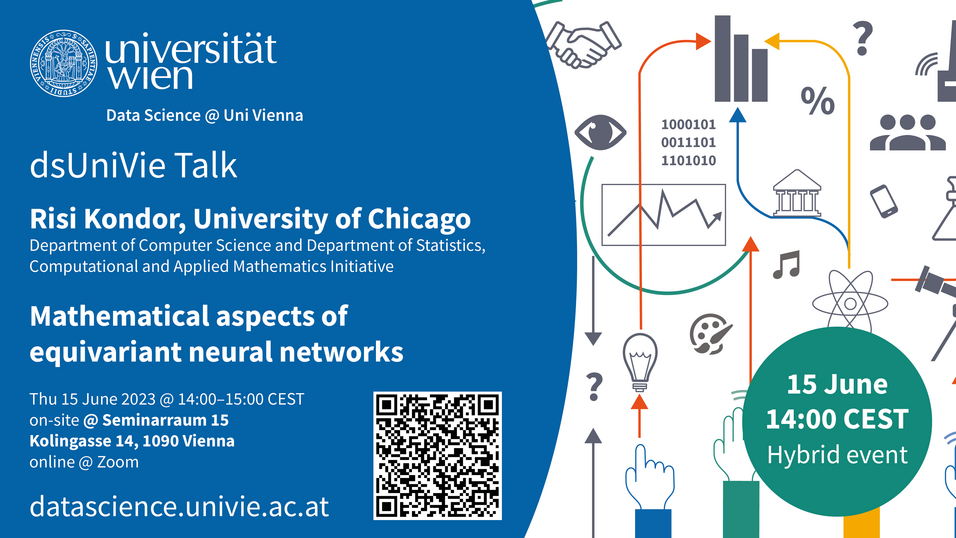Thursday, 15 June 2023 @ 14:00 CEST
On-site:
University of Vienna
Seminarraum 15
Kolingasse 14–16
1090 Vienna
Online:
https://univienna.zoom.us/j/68108456728?pwd=SWhOczJxVG1qWlZQYXN6aC85TG81Zz09
Meeting ID: 681 0845 6728
Passcode: Ds&23
Mathematical aspects of equivariant neural networks
Abstract:
Artificial neural networks are regarded more and more as universal learning machines, but in some cases, such as when learning the interaction between physical particles, it is important to explicitly code into them known invariances, such as invariance to translation, rotation, etc. The field of group equivariant neural networks has developed to address this challenge. In this talk I will give an overview of this quickly growing field, focusing on its foundations in representation theory, and giving some general prescriptions for building neural architectures that are equivariant to the action of any given compact group. I will demonstrate the methodology with some applications in image recognition, graph learning and force field learning for molecular dynamics.
Bio:
Risi Kondor holds a Ph.D. in computer science from Columbia University with a thesis focused on applying group theoretical methods in machine learning. He did his master's in knowledge discovery and data mining from Carnegie Mellon University in Pittsburgh, PA. Risi studied computational fluid dynamics in Brussels, Belgium, and physics at Eötvös University in Budapest, Hungary. He worked as Senior Research Scientist and Group Leader of the Machine Learning Group at the Center for Computational Mathematics, Flatiron Institute in New York. Prior to this, he held positions as a postdoctoral fellow at the Center for the Mathematics of Information at the California Institute of Technology and as a senior post-doctoral research associate at the Gatsby Computational Neuroscience Unit at University College London.
Since 2018, Risi Kondor has been Associate Professor at the University of Chicago and he is active at the Department of Computer Science (Crerar 221) and the Department of Statistics, Computational and Applied Mathematics Initiative (CAMI). His research group is focused on fundamental methodological developments in machine learning, specifically machine learning for physics and chemistry. Much of their work is related to computational harmonic analysis and group representation theory. Risi Kondor's group is responsible for some foundational work on equivariant neural networks and they are also engaged in developing high performance, open source software in both C++ and Python.
Research interests:
Statistical machine learning and computational harmonic analysis
- Machine learning for science (molecular modeling, drug discovery, etc.)
- Covariant deep learning architectures for learning graphs and other combinatorial objects
- Multiresolution and multiscale matrix factorizations
- Permutation problems and Fourier analysis on the symmetric group
- High performance large scale machine learning systems

